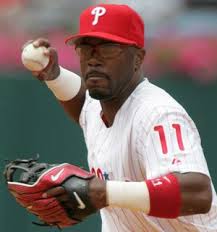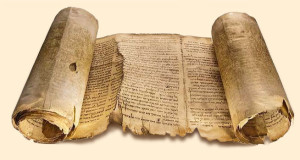By Joe Darrah
Philly has legitimately earned a reputation for “being tough” on Hall of Famers, world champions, MVPs, Rookies of the Year, All Stars, All Pros, (input your adjective here) and the list goes on. Then, there’s Jimmy Rollins, a great or very good player, depending on one’s criteria, who Philadelphia has always known it can’t count on to be a leader. A player who has somehow always gotten away with that in a city where nobody with his type of credentials ever does, even though the team has needed him to be that guy for almost the duration of his 14-year career.
Think about it.
He’s a guy who has always been well paid and has always been a “franchise face,” yet he’s never seriously been saddled with the highest of expectations that can bestow those high-profile and even low-profile Philadelphia athletes who’ve come before him and after him. Factor in that he’s also now been publicly made into an example by more than one manager for a perceived lack of hustle and/or conduct detrimental to a team’s success, not to mention his on-the-record criticisms of Philly fans, a set of supposedly mortal sins in the City of Brotherly Love, and his continued favorable reputation around here boarders the realm of mind-boggling.
How is it that Rollins by and large has been allowed to get away with just being “J-Roll” by the fan base and the media? Why has he been issued a free pass of sorts in this town, which is quite ironic considering the lack of walks he’s worked in a leadoff role he’s reportedly been stubborn to relinquish?
Like many things in life, I’m thinking it’s been all about timing for him. He may just be the once-in-a-generation example of how if you sneak into Philly at just the right time you can go an entire career being in the spotlight without the expectations.
What’s interesting to point out right away is that he’s somehow managed to avoid the associated pressures of being expected to lead some pretty bad teams (hello Andre Iguodala and former teammate Scott Rolen) as well as the scorn that can come from being a star player of great teams that have fallen short during respective championship-season runs (what do ya say, Allen Iverson, Eric Lindros, Mike Richards, Donovan McNabb, Randall Cunningham and current teammate Ryan Howard).
*Disclaimer before I go any further: I don’t dislike Rollins. I just remain bewildered that he has been able to share the spotlight without truly being called to task. And, no, this column has nothing to do with his traveling away from the team to be with pregnant wife.
Now, to continue.
Yes, Rollins has consistently remained among the elite shortstops (at least defensively) in the game since his first full season of 2001 while compiling what will at least be Hall of Fame consideration over the course of his career, owns the aforementioned MVP of 2007, has collected four gold gloves, is close to setting the franchise hits record over HOFer Mike Schmidt (another player who dealt with some harsh criticisms and expectations in his day) and in 2008 played a major role in bringing Philadelphia it’s first major sports championship in 25 years — all of that justifies how he could maintain a favorable legacy here. But in the same breath, I don’t get how the other athletes I’ve referred to could be criticized to no end while Rollins has been afforded the “that’s the way he is” excuse.
What follows is a little jog down memory lane and a perspective on how Rollins may have just been one of the greatest benefactors of convenience that this town has ever seen.
Entering Philly at a Convenient Time
As a 21-year-old, highly touted prospect Rollins may have started his career in Philadelphia at about the easiest time any athlete is likely to ever see. Astonishingly, when he joined the Phillies as a September call-up in 2000, baseball in Philadelphia was all but dead. The outdated Veteran’s Stadium had for years become a nationally mocked building during baseball’s “age of restoration” that was brought on by Baltimore’s Camden Yards, and much of what we cared about locally was “when and how” the city would fund and build a new baseball stadium that would once again make our ballpark inviting regardless of team talent. At a time when the Phillies organization did whatever it could to avoid big contracts, we as a whole showed our disdain for its miserly actions by letting attendance fall to embarrassing levels. Yes, it’s still hard to believe 14 years later that a team of mostly YOUNG, “INEXPENSIVE” FARM-DEVELOPED players who would come just two (2) wins shy of a division title just one year after Rollins’ MLB promotion (i.e. the 2001 Phillies) could be considered an afterthought in Philadelphia, but it was true. Iverson’s Sixers had owned the at that point with their mesmerizing run to the NBA Finals and realistic hope for the future still in tact while Lindros and his Flyers had just come to the end of what would end up being an unsuccessful quest to win a Stanley Cup. The still wet-behind-the-ear Phillies did not quite have the superstar appeal we once craved in Philly despite their relative success in the standings that summer. With an average attendance of fewer than 23,000 per game, that 2001 club ranked 24th in the MLB, literally a few people more than Minnesota per game.
Rollins would earn his first of three All Star appearances to date and finish third in ROY voting that year, establishing himself as a viable piece to the future. He’d also lead the league in at bats, stolen bases and triples and add legitimate spunk to a team that at the time featured rather uncharismatic stars in the likes of Bobby Abreu, Mike Lieberthal, Randy Wolf and, yes, Rolen — the limelight-avoiding “hick” hailing from the small town of Jasper Indiana who had little interest in conducting media interview yet was publicly on the record for criticizing the team’s lack of big-money spending and despite to that point having garnered three Gold Gloves and ROY honors (1997) had earned Public Enemy No. 1 status that would somehow continue after his trade to St. Louis in 2003. And though the Phillies from that point would make the city wait four more years before their first of five consecutive NL East titles despite the new stadium and hefty free agent contacts following the departure of Rolen and Curt Schilling, the Phillies casually remained an afterthought while Rollins, as the team’s best player, was conveniently allowed to be just that because the Eagles had become perennial Super Bowl contenders. The Phillies, simply, were allowed to lose. They didn’t matter enough to face the demand to win.
Hype & Happenstance
To be fair, it wasn’t just baseball that felt like it was dead as the 20th century made way for the 21st in Philadelphia. Football was also barely breathing, as most of us remember all too well. But in 1999 Andy Reid and McNabb ushered in a new era of football that would soon amass just about all the attention that Philadelphia could devote as the Sixers and Iverson quickly would enter a downward spiral just as quickly as they seemed destined for parade floats.
We all know how McNabb and Reid’s tenures played out, they and the Eagles never being able to fully recover from their “failure” to win Super Bowl XXXIX vs. Tom Brady’s SpyGaters in 2005. With the Flyers still a few years away from making a few surprising pushes back to Cup contention, the Eagles flashing some false bravado with Michael Vick and the Sixers for the most part sinking into the NBA hell save for a timely injury to the once dominant Derrick Rose, the Phillies finally sieged the spotlight beginning in 2004 with their remarkable last-day NL East championship that captivated a capacity crowd long before the ’08 champs would do the same. With the emergence of superstars Howard, Chase Utley and Cole Hamels with the “Rocky-like” storylines of the likes of Carlos Ruiz, Shane Victorino, Jaime Moyer and, gasp, Jason Werth (don’t like the guy one bit), Rollins still managed to remain, not an afterthought of course, but as one who could get away with simply being him as a player who had, seemingly, wasn’t worth fussing over being that the Phillies were annual contenders.
In August 2008, months before Brad Lidge and Chooch would embrace on the diamond in one of the city’s most picturesque sports moments, Rollins referred to Philadelphia fans as “frontrunners” on Fox’s The Best Damn Sports Show Period. Not only that, he praised the city of St. Louis (the hometown of Howard, who appeared on the show with Rollins) for it’s penchant to “support” its teams through good times and bad while Philly “is completely against you” at times of poor play. Meanwhile, the aforementioned Rolen will never live down the positive comments he made about baseball’s “heaven” as a Cardinal.
Team for the Ages
Today, the Phillies are viewed in this town by and large as a team with no chance to compete due to their average age (31.5 for Monday’s projected Opening Day lineup), which is curious because the 2009 team averaged 31 years. Last year’s Red Sox also averaged more than 30 years of age per player, as did ’01 Diamondbacks, ’02 Giants and ’04 Cards.
Rollins has once again been benched by a manager for lacking what he perceives to be healthy hustle and determination. But the focus remains largely on the Phillies collective age and Howard, who despite owning his own MVP trophy and ring and despite putting up a string of prolific offensive numbers over a seven-year stretch that Rollins would need a sedative to even potentially dream about, has endured beyond typical criticism for making the last outs in two playoff series’ and suffering a debilitating and career-altering injury just as his latest contract “truly” took affect. Regardless of Rollins does or says, Howard is likely to remain the guy who gets the most flack if the Phillies fail not just because of the amount of money he makes but because he has reached a level of greatness that Rollins has never reached and has never been expected to reach because of his personality.
Oh, and the Eagles have potentially revitalized their franchise with the entrance of Chip Kelly (who, I might add has made a pretty sleek entrance to Philly as well), the Flyers have quickly stolen the city’s hearts with an impressive stretch that almost assures they will make the playoffs and be a tough out for anyone while the Sixers have settled into that “you’re allowed to be bad” real estate that the Phillies once owned.
Apparently, Jimmy, the time has always been yours.
 Philly Sports Jabronis
Philly Sports Jabronis



